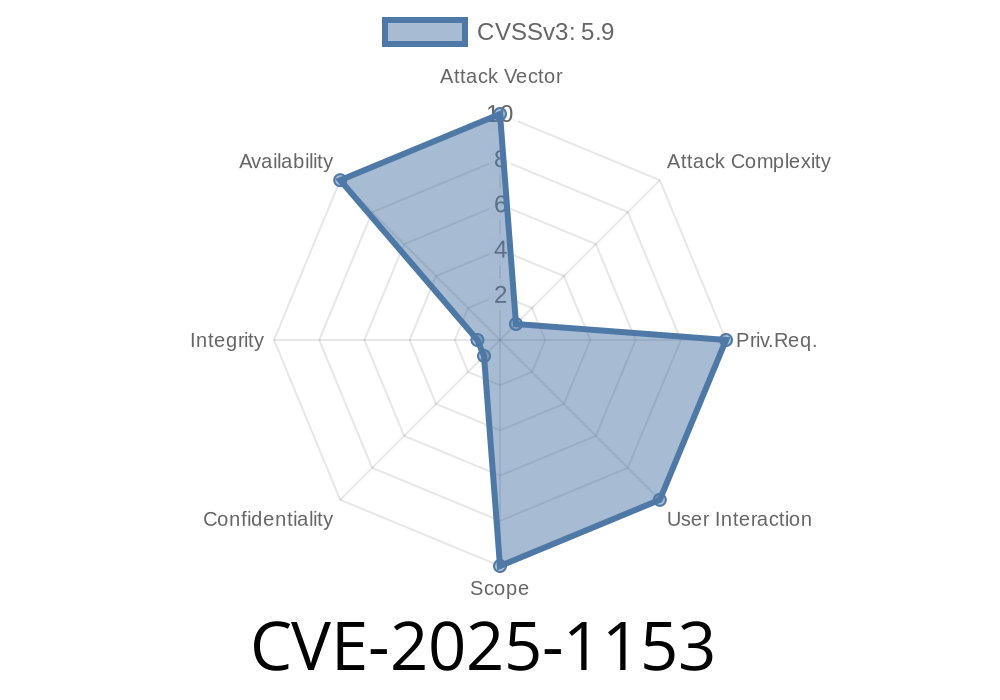In early 2025, security researchers uncovered a new vulnerability in GNU Binutils (versions 2.43 and 2.44) that deserves your attention: CVE-2025-1153. This post breaks down what happened, why it matters, shows example code, and guides you toward resolution.
What’s the Issue?
CVE-2025-1153 is a memory corruption issue found in the bfd_set_format function within the format.c source file of Binutils’ Binary File Descriptor (BFD) library. Under certain hard-to-exploit conditions, a remote attacker can cause a memory corruption, potentially destabilizing or crashing applications that use affected Binutils versions.
- Component Affected: GNU Binutils 2.43 / 2.44
Vulnerable Function: bfd_set_format (in format.c)
- Attack Vector: Remote — typically by tricking a user or automation into processing a specially crafted binary object file.
How Does the Vulnerability Work?
The BFD library is used in hundreds of open-source projects, from the core Binutils command-line tools (objdump, readelf, nm, etc) up to linkers in large build pipelines. When bfd_set_format processes a malformed binary file with certain characteristics, it mishandles buffer operations. Specifically, improper bounds checking or pointer manipulation allows attacker-supplied data to corrupt memory.
Vulnerable Code Snippet
Here’s a simplified pseudocode based on the vulnerable bfd_set_format logic (note: original C code is much larger and more complex):
bool bfd_set_format(bfd *abfd, bfd_format format) {
// ...snip...
/* Logic vulnerable to buffer overflows or use-after-free, depending on state */
if (abfd->format != format) {
abfd->format = format;
if (abfd->format_functions.set_section_contents)
abfd->format_functions.set_section_contents(abfd, ...); // External callback!
}
// ...snip...
}
Causes the callback or memory layout to be corrupted,
…they may produce unpredictable memory-writing behaviors.
A Proof-of-Concept
The public *exploit* for this issue is not widely available yet due to the difficulty of reliably exploiting it for anything beyond crashes. However, a reproducer file might look like this pseudocode:
# Create a binary with a weird custom format to trigger bfd_set_format bugs
with open("evil.o", "wb") as f:
f.write(b"\x7fELF" + b"\x00"*60) # ELF signature + weird header
# Deliberately fuzzed records that bypass internal checks...
Then, passing this file to a vulnerable objdump may trigger a crash
$ objdump -D evil.o
Segmentation fault (core dumped)
Exploit Complexity Explained
- Remotely Exploitable: If you have a scenario where a service parses external object files (for example, a web-based binary analysis tool), an attacker can mail in a malicious file.
- High Attack Complexity: It’s *not* trivially triggerable. Exploiting it beyond a crash would likely require *precise* knowledge of memory layouts and randomization settings.
- No Known RCE: At the time of writing, nobody has demonstrated full code execution through this flaw. Mostly denial-of-service (DoS) risk.
Original References
- Mitre CVE: CVE-2025-1153 Detail
GNU Binutils Upstream Commit (Patch):
8d97c1a53f3dc9fd8e1ccdb039b8a33d50133150
Official Release Notes:
Consider yourself exposed if you
- Use Binutils 2.43/2.44 or any applications/toolchains linked against those BFD versions
What Should I Do?
Immediate Recommendation:
Upgrade to Binutils 2.45 or later. This applies both to toolchains and application dependencies!
If you cannot upgrade now:
Monitor for abnormal crashes when analyzing externally-supplied binaries.
Patch Application:
To manually patch, apply the commit 8d97c1a5 (if backporting to custom builds).
Final Notes
CVE-2025-1153 is a classic example of why complex file parsing—and the interfaces between formats and code—remains dangerous, even in mature projects. While the exploitability is low, any memory corruption in widely-used toolchains deserves prompt remediation.
If you’re a maintainer, prioritize the upgrade. If you’re a user, audit your dependencies and ask your providers to patch. Stay safe and code securely!
*This article is exclusive to this platform and written in plain English for easy understanding. Share responsibly; for technical deep dives, review the official links provided above.*
Timeline
Published on: 02/10/2025 19:15:39 UTC
Last modified on: 03/03/2025 16:52:20 UTC
